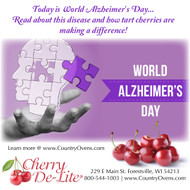Tart Cherry's and Degenerative Brain Disorders
Posted by Country Ovens, Ltd. | Cherry De-Lite on Sep 20th 2021
History of World Alzheimer’s Day
Alzheimer’s is a form of dementia that affects memory and impairs daily function. It is responsible for somewhere between 60% and 80% of dementia cases. Alois Alzheimer, a German psychiatrist, was the first to identify the disease while treating a German woman in 1901. The disease was named after him.
The condition is often regarded as a family disease due to the impact it has on those closest to the victim. Alzheimer’s ranks among the leading causes of death in the United States. There are no prevention measures and it has no cure, even the progression of the disease cannot be slowed.
Founded in 1984, Alzheimer’s Disease
International (ADI) is charged with supporting victims and conducting
outreach to educate people and expedite related policies.
In 1994,
ADI introduced World Alzheimer’s Day in Edinburgh during their annual
conference on September 21 to mark their 10th anniversary. ADI
coordinates World Alzheimer’s Day and World Alzheimer’s Month across the
globe, working with member organizations and associations to organize
events and create awareness.
The first ‘World Alzheimer Report’ was launched in 2009 on World Alzheimer’s Day and yearly reports have been issued every year since. Although the impact of the observance is spreading, the information gap and stigmatization concerning dementia remains an issue. Many people see the disease as a natural part of the aging process.
Granted, advancement in age is among the major causes of Alzheimer’s disease, but it isn’t completely an elderly disease. There are about 200,000 people under the age of 65 struggling with Alzheimer’s in the United States alone.
To mark this observance, concerned individuals and organizations can participate by creating awareness and reaching out to their nation’s Alzheimer’s association.
Tart Cherry research on degenerative brain disorders...
*Source: HealthLine.com
Degenerative brain disorders like Parkinson's and Alzheimer's are thought to be caused, in part, by oxidative stress.
Tart cherries and their juice contain large amounts of antioxidants and other beneficial plant compounds that may have protective effects on brain cells (23).
In one study, consuming 16 ounces (480 ml) of tart cherry juice daily improved antioxidant defenses in healthy older men and women (24).
In another study, older adults with mild-to-moderate dementia consumed either 6.5 ounces (200 ml) of tart cherry juice or a placebo for 12 weeks.
Adults in the cherry juice group experienced improvements in verbal fluency and short-term and long-term memory, whereas those in the placebo group experienced no improvements (25).


